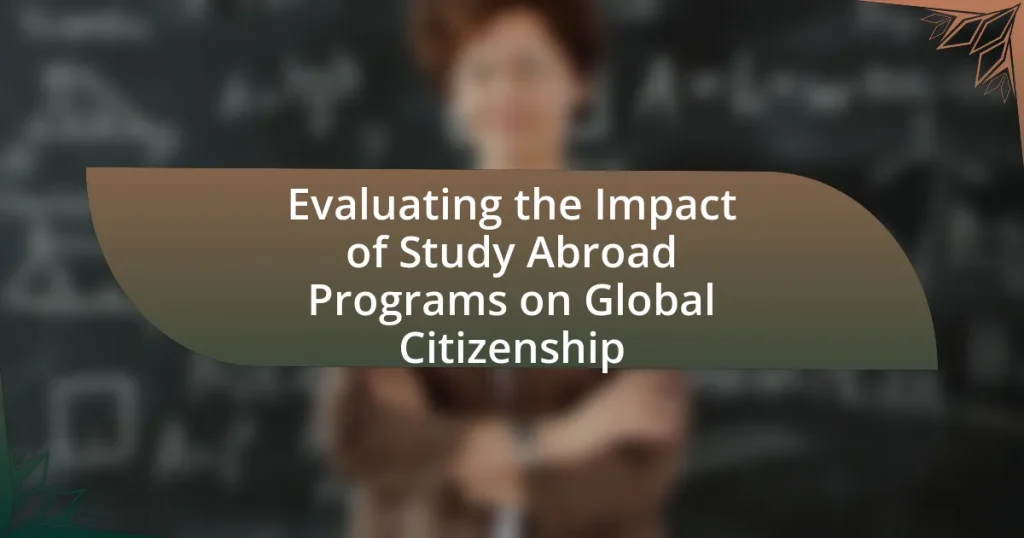Study abroad programs are structured educational experiences that enable students to study in foreign countries, aiming to enhance cultural awareness, language skills, and global citizenship. The article evaluates the impact of these programs on students, highlighting their contributions to intercultural competence, personal development, and career prospects. It discusses various types of study abroad programs, the challenges students face, and the measurable benefits, including improved academic performance and employability. Additionally, the article outlines best practices for maximizing the study abroad experience, emphasizing the importance of cultural immersion and effective budgeting strategies.

What are Study Abroad Programs and Their Objectives?
Study abroad programs are structured educational experiences that allow students to pursue academic studies in a foreign country. The primary objectives of these programs include enhancing cultural awareness, improving language skills, and fostering global citizenship. By immersing students in different cultural contexts, these programs aim to develop critical thinking and adaptability, which are essential for navigating an increasingly interconnected world. Research indicates that students who participate in study abroad programs often report increased intercultural competence and a greater understanding of global issues, thereby reinforcing the importance of these programs in promoting global citizenship.
How do Study Abroad Programs contribute to Global Citizenship?
Study abroad programs contribute to global citizenship by fostering cross-cultural understanding and enhancing students’ awareness of global issues. These programs immerse students in diverse cultural environments, allowing them to engage with different perspectives and practices. Research indicates that participants in study abroad programs report increased intercultural competence, which is essential for effective global citizenship. For instance, a study by the Institute of International Education found that 90% of students who studied abroad felt more culturally aware and engaged with global issues post-experience. This exposure not only broadens their worldview but also encourages active participation in addressing global challenges, thereby reinforcing their role as informed global citizens.
What skills and perspectives do students gain through these programs?
Students gain critical skills and diverse perspectives through study abroad programs, enhancing their global citizenship. These programs foster intercultural communication skills, enabling students to navigate and appreciate cultural differences effectively. Additionally, they develop adaptability and problem-solving abilities by facing new challenges in unfamiliar environments. Research indicates that participants often report increased empathy and a broader worldview, as they engage with local communities and understand global issues from multiple viewpoints. This combination of skills and perspectives prepares students to contribute positively to a global society.
How do cultural exchanges enhance global awareness?
Cultural exchanges enhance global awareness by facilitating direct interactions between individuals from diverse backgrounds, which fosters understanding and appreciation of different cultures. These exchanges allow participants to experience new perspectives, traditions, and values firsthand, leading to a more nuanced worldview. For instance, a study by the Institute of International Education found that students who participated in study abroad programs reported increased cultural sensitivity and awareness, with 90% of respondents acknowledging that their experiences abroad helped them understand global issues better. This direct engagement not only broadens individual perspectives but also contributes to a more interconnected global community, as participants often share their experiences and insights upon returning home.
What are the different types of Study Abroad Programs?
The different types of study abroad programs include exchange programs, direct enrollment programs, faculty-led programs, internship programs, and volunteer programs. Exchange programs allow students to attend a partner institution abroad while hosting international students at their home institution. Direct enrollment programs enable students to enroll directly in a foreign university, often immersing them in the local academic culture. Faculty-led programs are organized by home institutions, where faculty members lead students on short-term trips, often focusing on specific subjects. Internship programs provide practical work experience in an international setting, enhancing professional skills. Volunteer programs allow students to engage in community service abroad, fostering global citizenship through active participation in local initiatives. Each type of program offers unique opportunities for cultural immersion and personal development, contributing to a broader understanding of global issues.
What are the distinctions between short-term and long-term programs?
Short-term programs typically last from a few weeks to a few months, while long-term programs extend for six months or more. Short-term programs often focus on intensive, immersive experiences that provide quick exposure to a new culture and language, whereas long-term programs allow for deeper engagement, fostering sustained relationships and comprehensive understanding of the host country. Research indicates that long-term study abroad participants report higher levels of cultural adaptation and global awareness compared to their short-term counterparts, as evidenced by a study published in the Journal of Studies in International Education, which found that long-term participants demonstrated greater intercultural competence and personal growth.
How do internships and volunteer opportunities fit into Study Abroad Programs?
Internships and volunteer opportunities are integral components of Study Abroad Programs, enhancing students’ practical experience and cultural immersion. These experiences allow participants to apply academic knowledge in real-world settings, fostering skills such as adaptability, communication, and teamwork. Research indicates that students who engage in internships or volunteer work while studying abroad report higher levels of personal growth and intercultural competence, which are essential aspects of global citizenship. For instance, a study by the Institute for the International Education of Students found that 90% of students who participated in internships abroad felt more prepared for their future careers, demonstrating the significant impact these opportunities have on both professional development and global awareness.

What are the Measurable Impacts of Study Abroad Programs on Students?
Study abroad programs measurably impact students by enhancing their academic performance, cultural awareness, and employability. Research indicates that students who participate in these programs often achieve higher GPAs and demonstrate improved language skills, as evidenced by a study from the Institute of International Education, which found that 90% of study abroad alumni reported increased self-confidence and adaptability. Additionally, a survey by the NAFSA: Association of International Educators revealed that 80% of employers value international experience, indicating that study abroad significantly boosts career prospects.
How do Study Abroad Programs affect students’ personal development?
Study abroad programs significantly enhance students’ personal development by fostering independence, cultural awareness, and adaptability. These programs immerse students in diverse environments, which challenges them to navigate new social and academic landscapes. Research indicates that 96% of students who studied abroad reported increased self-confidence and personal growth, as highlighted in a study by the Institute of International Education. Additionally, exposure to different cultures promotes empathy and global awareness, essential traits for effective global citizenship. Thus, study abroad experiences are instrumental in shaping well-rounded individuals prepared for a globalized world.
What changes in self-confidence and independence do students experience?
Students experience significant increases in self-confidence and independence during study abroad programs. These programs often require students to navigate unfamiliar environments, which fosters problem-solving skills and adaptability. Research indicates that 90% of students reported enhanced self-esteem and a greater sense of autonomy after participating in such programs, as they learn to manage daily tasks independently and engage with diverse cultures. This growth in self-confidence and independence is crucial for developing global citizenship, as it empowers students to take initiative and embrace new experiences.
How do these programs influence students’ career prospects?
Study abroad programs significantly enhance students’ career prospects by providing them with international experience, cultural competence, and language skills. These attributes are highly valued by employers in a globalized job market. Research indicates that 97% of students who studied abroad found employment within a year of graduation, compared to 49% of those who did not participate in such programs. Additionally, students who studied abroad report higher starting salaries, with an average increase of 25% compared to their peers. This data underscores the positive correlation between study abroad experiences and improved career outcomes.
What are the academic benefits of participating in Study Abroad Programs?
Participating in Study Abroad Programs enhances academic benefits such as improved language skills, exposure to diverse educational systems, and increased cultural awareness. These programs allow students to immerse themselves in a new language environment, leading to significant improvements in language proficiency, as evidenced by studies showing that students who study abroad often achieve higher language competency than their peers who remain at home. Additionally, students experience different teaching methodologies and curricula, which can foster critical thinking and adaptability. Research indicates that students who study abroad report higher levels of engagement and satisfaction with their academic experience, contributing to better academic performance and graduation rates. Furthermore, exposure to diverse cultures enhances students’ global perspectives, preparing them for a more interconnected world.
How do these programs enhance language skills and academic performance?
Study abroad programs enhance language skills and academic performance by immersing students in a foreign language environment, which accelerates language acquisition through practical use. Research indicates that students participating in study abroad programs demonstrate a 30% improvement in language proficiency compared to their peers who remain in their home country. Additionally, these programs foster critical thinking and adaptability, skills that are essential for academic success. A study by the Institute of International Education found that 90% of students who studied abroad reported enhanced academic performance, attributing this to increased engagement and motivation in their studies.
What role does exposure to diverse educational systems play?
Exposure to diverse educational systems enhances global citizenship by fostering critical thinking, cultural awareness, and adaptability. Engaging with various pedagogical approaches allows students to appreciate different perspectives and develop a more nuanced understanding of global issues. Research indicates that students who study abroad demonstrate increased intercultural competence and a greater willingness to engage in global challenges, as evidenced by a study from the Institute of International Education, which found that 90% of study abroad alumni reported improved problem-solving skills and a deeper appreciation for cultural diversity.

What Challenges Do Students Face in Study Abroad Programs?
Students face several challenges in study abroad programs, including cultural adjustment, language barriers, financial constraints, and academic differences. Cultural adjustment can lead to feelings of isolation and homesickness, as students navigate unfamiliar social norms and practices. Language barriers often hinder effective communication, impacting both academic performance and social interactions. Financial constraints pose significant obstacles, as students must manage tuition, living expenses, and travel costs, which can lead to stress and limit their experiences. Additionally, academic differences, such as varying educational systems and grading practices, can create confusion and affect students’ academic success. These challenges are well-documented in studies, such as the “Impact of Study Abroad on Students’ Academic and Personal Development” by the Institute of International Education, which highlights the complexities students encounter while adapting to new environments.
What are common cultural adjustment issues encountered by students?
Common cultural adjustment issues encountered by students include language barriers, social isolation, and differing academic expectations. Language barriers can hinder effective communication and integration into the local culture, making it difficult for students to form relationships and participate in academic discussions. Social isolation often arises from cultural differences and unfamiliarity with local customs, leading to feelings of loneliness and homesickness. Additionally, differing academic expectations, such as teaching styles and assessment methods, can create confusion and stress for students adapting to a new educational environment. These issues are supported by research indicating that international students frequently report challenges related to communication, social integration, and academic adaptation during their study abroad experiences.
How can students effectively navigate language barriers?
Students can effectively navigate language barriers by utilizing language learning tools, engaging in immersive experiences, and seeking support from peers and instructors. Language learning tools, such as mobile apps and online courses, provide structured learning opportunities that enhance vocabulary and grammar skills. Immersive experiences, like participating in local cultural events or conversing with native speakers, facilitate practical language use and improve fluency. Additionally, seeking support from peers and instructors fosters a collaborative learning environment, allowing students to practice language skills and receive constructive feedback. Research indicates that students who actively engage in these strategies report higher confidence and proficiency in their language abilities, which is crucial for successful communication in study abroad programs.
What strategies can help students cope with homesickness?
Students can cope with homesickness by establishing a routine, staying connected with family and friends, and engaging in social activities. Establishing a routine helps create a sense of normalcy and stability, which can alleviate feelings of anxiety associated with being away from home. Staying connected through regular calls or video chats with loved ones reinforces emotional support, making the transition easier. Engaging in social activities, such as joining clubs or participating in local events, fosters new friendships and a sense of belonging, which can significantly reduce feelings of isolation. Research indicates that social support is crucial for emotional well-being, particularly in unfamiliar environments, highlighting the effectiveness of these strategies in managing homesickness.
How do financial considerations impact participation in Study Abroad Programs?
Financial considerations significantly impact participation in Study Abroad Programs by influencing students’ ability to afford tuition, travel, and living expenses. According to a report by the Institute of International Education, 70% of students cite cost as a major barrier to studying abroad. This financial burden can deter students from lower-income backgrounds, limiting their opportunities for global engagement and cultural exchange. Additionally, the availability of scholarships and financial aid can enhance participation rates, as evidenced by programs that have increased funding, resulting in a 20% rise in enrollment among underrepresented groups.
What funding options are available for students?
Students have several funding options available to support their education, including scholarships, grants, student loans, work-study programs, and financial aid packages. Scholarships are merit-based awards that do not require repayment, while grants are typically need-based and also do not require repayment. Student loans provide funds that must be repaid with interest, and work-study programs allow students to earn money through part-time employment while attending school. Financial aid packages often combine these options to meet the financial needs of students. According to the National Center for Education Statistics, approximately 85% of undergraduate students receive some form of financial aid, highlighting the importance and availability of these funding options.
How can students budget effectively for their study abroad experience?
Students can budget effectively for their study abroad experience by creating a detailed financial plan that includes all potential expenses. This plan should account for tuition, accommodation, food, transportation, insurance, and personal expenses. Research indicates that students who prepare a comprehensive budget are more likely to manage their finances successfully while abroad. For instance, a study by the Institute of International Education found that students who budgeted effectively reported a 30% reduction in financial stress during their time abroad. Additionally, utilizing tools such as budgeting apps and consulting with financial advisors can enhance students’ ability to track and adjust their spending in real-time, ensuring they stay within their financial limits.
What best practices can enhance the Study Abroad experience for students?
To enhance the Study Abroad experience for students, best practices include thorough pre-departure preparation, cultural immersion, and ongoing support. Thorough pre-departure preparation equips students with essential information about their host country, including cultural norms, language basics, and logistical details, which can significantly reduce culture shock and enhance adaptability. Cultural immersion, such as engaging with local communities and participating in local events, fosters deeper understanding and appreciation of different cultures, which is crucial for developing global citizenship. Ongoing support from academic advisors and local coordinators ensures that students have access to resources and assistance throughout their stay, promoting a positive and enriching experience. Research indicates that students who actively engage in these practices report higher satisfaction and greater personal growth during their study abroad programs.
How can students prepare for their cultural immersion?
Students can prepare for their cultural immersion by researching the culture, language, and customs of the host country. Engaging in this preparatory research helps students understand social norms, communication styles, and cultural practices, which can enhance their adaptability and interaction with locals. For instance, studies show that students who learn basic phrases in the local language experience improved social integration and communication, leading to a more enriching immersion experience. Additionally, participating in pre-departure orientation programs can provide valuable insights and practical tips for navigating cultural differences effectively.
What resources are essential for maximizing the benefits of Study Abroad Programs?
Essential resources for maximizing the benefits of Study Abroad Programs include comprehensive pre-departure orientation, access to academic support services, and cultural immersion opportunities. Pre-departure orientation equips students with essential information about the host country, cultural norms, and academic expectations, which enhances their preparedness and adaptability. Access to academic support services, such as tutoring and counseling, ensures that students can navigate academic challenges effectively, contributing to their overall success. Cultural immersion opportunities, such as local internships or community service, foster deeper engagement with the host culture, promoting global citizenship and intercultural competence. These resources collectively enhance the educational experience and personal growth of students participating in Study Abroad Programs.
